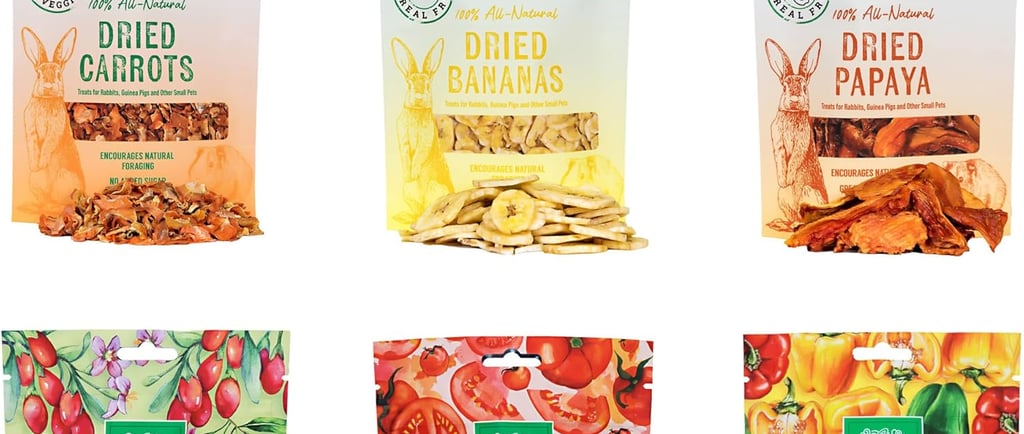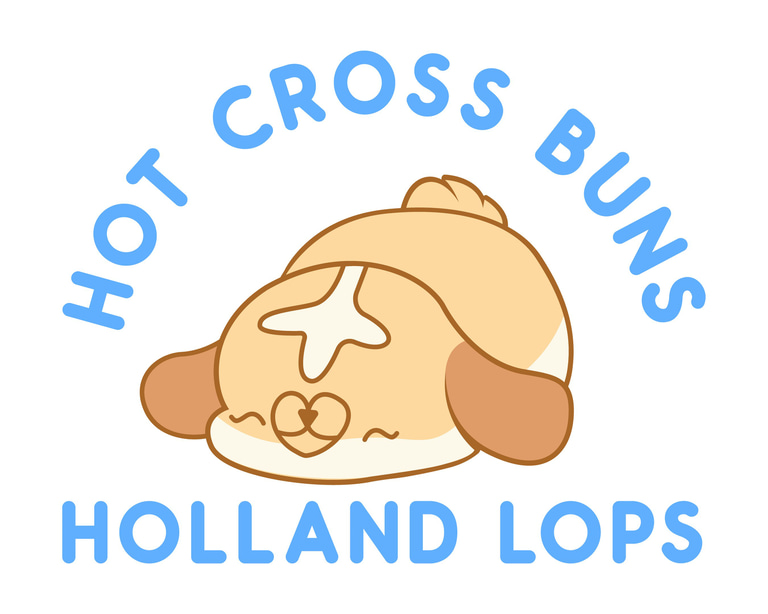About Packaged Rabbit Treats
Read the good, bad, and ugly about treats marketed for rabbits.
Amy J.
5/28/20253 min read


**We're taking a break from our posts about what rabbits are communicating with their various behaviors to discuss the potential dangers hidden in treats marketed for rabbits. **
The bulk of a rabbit's diet should be high-quality timothy or orchard grass hay (or other hay recommended by your rabbit-knowledgeable veterinarian if timothy or orchard grass aren't available in your area.) Alfalfa hay is only acceptable for rabbits under six months of age. Hay should make up 80-90% of your rabbit's diet. At Hot Cross Buns, we lean towards 90%.
Roughly 5-10% of his/her diet should be high-quality pellets, the chief ingredient of which should be timothy hay, ideally.
The remaining small percentage is permitted for treats. Treats containing the wrong types of ingredients can spoil your rabbit's desire to eat a healthy quantity of hay by giving it a sweet tooth for the added sugars packaged treats contain in the form of actual sugar, molasses, honey, or high-sugar fruits and veggies. Packaged treats often contain unhealthy fillers which have no place in a rabbit's diet. Additionally, the oils or oil-containing ingredients (seeds, nuts, and corn, specifically) that are included, are high in fat and can quickly lead to unhealthy weight-gain and a shorter life-span for your beloved pet. Other ingredients can lead to GI Stasis or other tummy troubles, and can result in life-threatening illness and very expensive veterinarian bills to treat it.
The best treats for your rabbit are very simple herbs, vegetables, or fruits in very small quantities, introduced slowly, being mindful of the sugar content in each one. Sweeter fruits and veggies (like bananas and carrots) should be given in tiny servings, so as to not disrupt the bunny's gut bacteria and cause intestinal distress. To learn more about giving your rabbit treats, please read our post about Rabbit Treat Guidelines.
Regarding treats, the rule of thumb should be
no seeds
no nuts
no corn
no dairy (milk, yogurt, whey)
no sugar (ideally no honey, cane sugar, or molasses, too...sweetness should come from the fruit included)
no synthetic dyes (such as Yellow 5, Blue 40, Red 4 - these aren't good for anyone!)
no wheat, other than wheatgrass
most flours (rice, wheat, corn are not good, but barley and oat/oat groat flours are okay)
no oils (vegetable, soy, sunflower, corn, peanut, etc.)
no egg products
no fishmeal or seafood (yes, these were listed ingredients)
Please keep in mind that the majority of companies make these treats with multiple species of animals in mind. Often called "small animal" or "pocket pet" treats, they are supposed to be healthy for multiple species of animals, all of which have very different and specific dietary requirements. A treat marketed for rabbits is often also geared towards chinchillas, guinea pigs, hamsters, gerbils, and mice, none of which have the same needs as a bunny. While it's fine for a mouse to nibble on seeds, they aren't a good choice for a lagomorph. Rabbits are not rodents.
After reading through the ingredients from many, many packaged treats, we couldn't believe the number of no-no's found in most of them. We're not going to single out the products by name, but PLEASE take the time to read the ingredients before purchasing and giving them to your rabbits. The below companies were the worst offenders among the ingredient labels we read:
Vitakraft
MENU
Wild Harvest
Sun Seed
Kaytee
There were a few acceptable treats from these companies, but the majority made us cringe.
We found some healthier options from a few sources, but, again, please take the time to read the ingredients labels. Bun-parents should always be aware of what they are feeding their beloved pets, and companies are known for changing ingredients without warning.
These companies have "cleaner" products with healthier ingredients, but please be cautious if you're avoiding alfalfa hay altogether.
Rosewood Naturals
Small Pet Select
Oxbow
The best treats for your rabbits are organically grown bunny-safe herbs, veggies, and fruits you grow yourself or purchase from a trusted source.
If you discover you have been giving your rabbit a not-so-healthy treat, please don't beat yourself up. Marketing companies are incredibly good at convincing all consumers that their products are the best of the best. With pictures of happy bunnies on the package and "pretty" treats inside that are designed to entice, most bunny parents fall victim to their marketing ploys. The only thing we can do is to help educate you to know what should and should not be in a bunny treat, to advise you to read the labels, and to encourage you to make or grow your own treats at home. Simplicity is a very good thing.
We applaud and encourage you as you choose healthy treats for your beloved pet rabbit(s).
